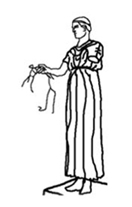
Design about
the
Charioteer of
Delphi, around 470 B.C., bronze, height 180cm
In the 50s Günther
Anders could still draw together his
observations in
regards of the relation between humans and machines in
the term 'prometheische
Scham' (Prometheic shame). With this he
named the shame
that the human being feels because of his 'fehlerhaften
Kreatürlichkeit' (being a creature with
flaws) in the
face the perfection of machines. A problem that Apollon
doesn't have
anyways on his carriage. Also charioteer fantasies have
no problem
with creaturalness, it would be worth a study how sturdy
the field of
words is of a once established commonplace. Gnther
Anders however with his thoughts has no
chances against
power fantasies run wild.
Cars and motorcycles are mythological objects. Vehicles expand the organical possibilities of the human; they allow him something he is not capable of doing because of his hereditary body powers and by this increase his power and feelings of power. In both instances the function of subject of the self steering and the personal mastership are deciding moments of fascination.
Driving of a motorcycle as well as the ancient carriage driving gain from the simultaneity of feelings of power and powerlessness. On one hand the with the vehicle intertwined driver participates very directly with the strength of his machine and can increase the feeling of personal mastership in this way. The strength of the motor pushes itself literally onto the sensual experience. The movement and the feeling of the whole body participates with the steering of the vehicle: for example one has to move into the curve with the whole body. With increasing acceleration and gaining speed the intensity of the sensual input grows and by that the feelings of personal power.
On the other hand: The more intensive the greater the danger. It exists an emens protectivlessness and dependency of the behaviour of the object with which one speeds through the land. The compound word Wagen-Lenker (charioteer) so-to-say sticks together this subject/object adherency. The feelings of autonomy and heteronomy grow in one and the same process; the overpowering subject experience of whole-body self-steering is to obtain only in approaching perceivably to the danger of subject extinction, hence the danger of a deadly traffic accident through loss of control over the objects which only give one the subject experience.
The 'the feeling of bursting of surviving'* feeds itself from the continuously present closeness of death: The thrill of driving a motor cycle is dominantly founded on that using
_____________
* literal translation: [Ueber-]Lebens = surviving. "Leben" means 'life', "Ueberleben" means 'surviving' - so the German term here plays on 'life' on one hand, but also on 'surviving' as something like a variation of living.
Cars and motorcycles are mythological objects. Vehicles expand the organical possibilities of the human; they allow him something he is not capable of doing because of his hereditary body powers and by this increase his power and feelings of power. In both instances the function of subject of the self steering and the personal mastership are deciding moments of fascination.
Driving of a motorcycle as well as the ancient carriage driving gain from the simultaneity of feelings of power and powerlessness. On one hand the with the vehicle intertwined driver participates very directly with the strength of his machine and can increase the feeling of personal mastership in this way. The strength of the motor pushes itself literally onto the sensual experience. The movement and the feeling of the whole body participates with the steering of the vehicle: for example one has to move into the curve with the whole body. With increasing acceleration and gaining speed the intensity of the sensual input grows and by that the feelings of personal power.
On the other hand: The more intensive the greater the danger. It exists an emens protectivlessness and dependency of the behaviour of the object with which one speeds through the land. The compound word Wagen-Lenker (charioteer) so-to-say sticks together this subject/object adherency. The feelings of autonomy and heteronomy grow in one and the same process; the overpowering subject experience of whole-body self-steering is to obtain only in approaching perceivably to the danger of subject extinction, hence the danger of a deadly traffic accident through loss of control over the objects which only give one the subject experience.
The 'the feeling of bursting of surviving'* feeds itself from the continuously present closeness of death: The thrill of driving a motor cycle is dominantly founded on that using
_____________
* literal translation: [Ueber-]Lebens = surviving. "Leben" means 'life', "Ueberleben" means 'surviving' - so the German term here plays on 'life' on one hand, but also on 'surviving' as something like a variation of living.